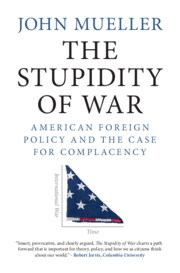Book contents
- The Stupidity of War
- The Stupidity of War
- Copyright page
- Dedication
- Contents
- Figures
- Acknowledgements
- Additional material
- Prologue The Rise of War Aversion and the Decline of International War
- Part I Assessing the Threat Record
- 1 Korea, Massive Extrapolation, Deterrence, and the Crisis Circus
- 2 Containment, Vietnam, and the Curious End of the Cold War
- 3 Military Intervention and the Continued Quest for Threat after the Cold War
- 4 Al-Qaeda and the 9/11 Wars in Afghanistan, Iraq, Pakistan
- 5 Chasing Terrorists Around the Globe and Other Post-9/11 Ventures
- Part II Evaluating Present Threats
- Afterword Aversion to International War as an Explanatory Variable
- Appendix: A Sardonic Litany
- Notes
- References
- Index
2 - Containment, Vietnam, and the Curious End of the Cold War
from Part I - Assessing the Threat Record
Published online by Cambridge University Press: 01 March 2021
- The Stupidity of War
- The Stupidity of War
- Copyright page
- Dedication
- Contents
- Figures
- Acknowledgements
- Additional material
- Prologue The Rise of War Aversion and the Decline of International War
- Part I Assessing the Threat Record
- 1 Korea, Massive Extrapolation, Deterrence, and the Crisis Circus
- 2 Containment, Vietnam, and the Curious End of the Cold War
- 3 Military Intervention and the Continued Quest for Threat after the Cold War
- 4 Al-Qaeda and the 9/11 Wars in Afghanistan, Iraq, Pakistan
- 5 Chasing Terrorists Around the Globe and Other Post-9/11 Ventures
- Part II Evaluating Present Threats
- Afterword Aversion to International War as an Explanatory Variable
- Appendix: A Sardonic Litany
- Notes
- References
- Index
Summary
Any Soviet expansionism was likely to be expressed primarily through subversion, diplomatic and military pressure, revolution, and armed uprising—all inspired, partly funded, and heavily influenced by Moscow and later by Beijing. The policy of containment was designed to deal with this threat, but it was to impel the United States into a costly “test-case” war in Vietnam against an enemy that proved to be essentially undefeatable: proportionately, the Communists suffered battle deaths there at a rate almost unique in modern warfare, and it seems unlikely that the Vietnam War could have been won by the US at any reasonable cost. The problem containment was fabricated to deal with went away only when the policy itself lapsed after 1975 when an exhausted and much over-extended Soviet Union abandoned its expansionist ideology. The problems the Soviets came to confront were a direct result of misguided domestic and foreign policies, and these would have come about no matter what policy the West chose to pursue. The demise of the Cold War principally resulted from an important change in ideas, not from military or other changes.
- Type
- Chapter
- Information
- The Stupidity of WarAmerican Foreign Policy and the Case for Complacency, pp. 47 - 64Publisher: Cambridge University PressPrint publication year: 2021



